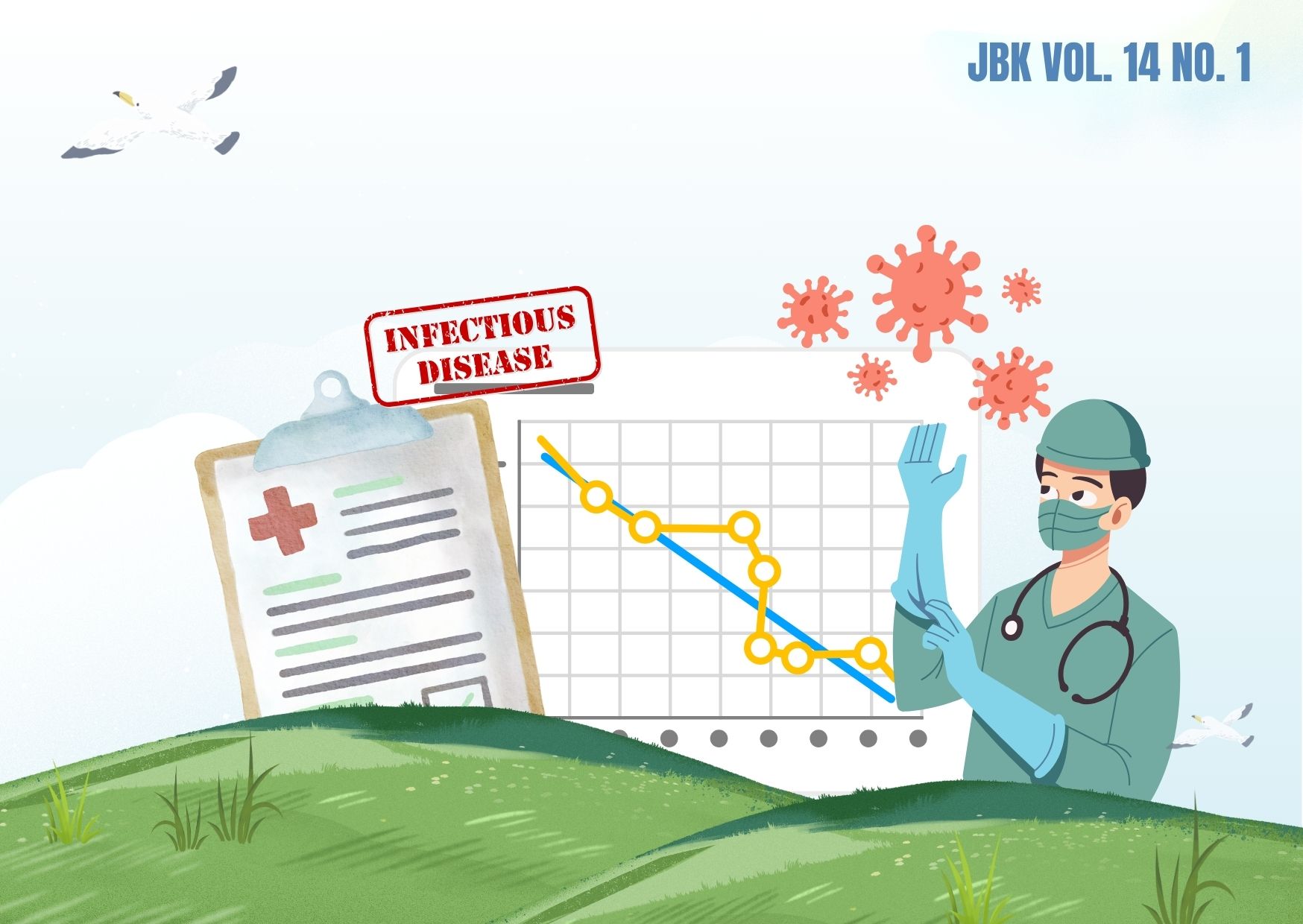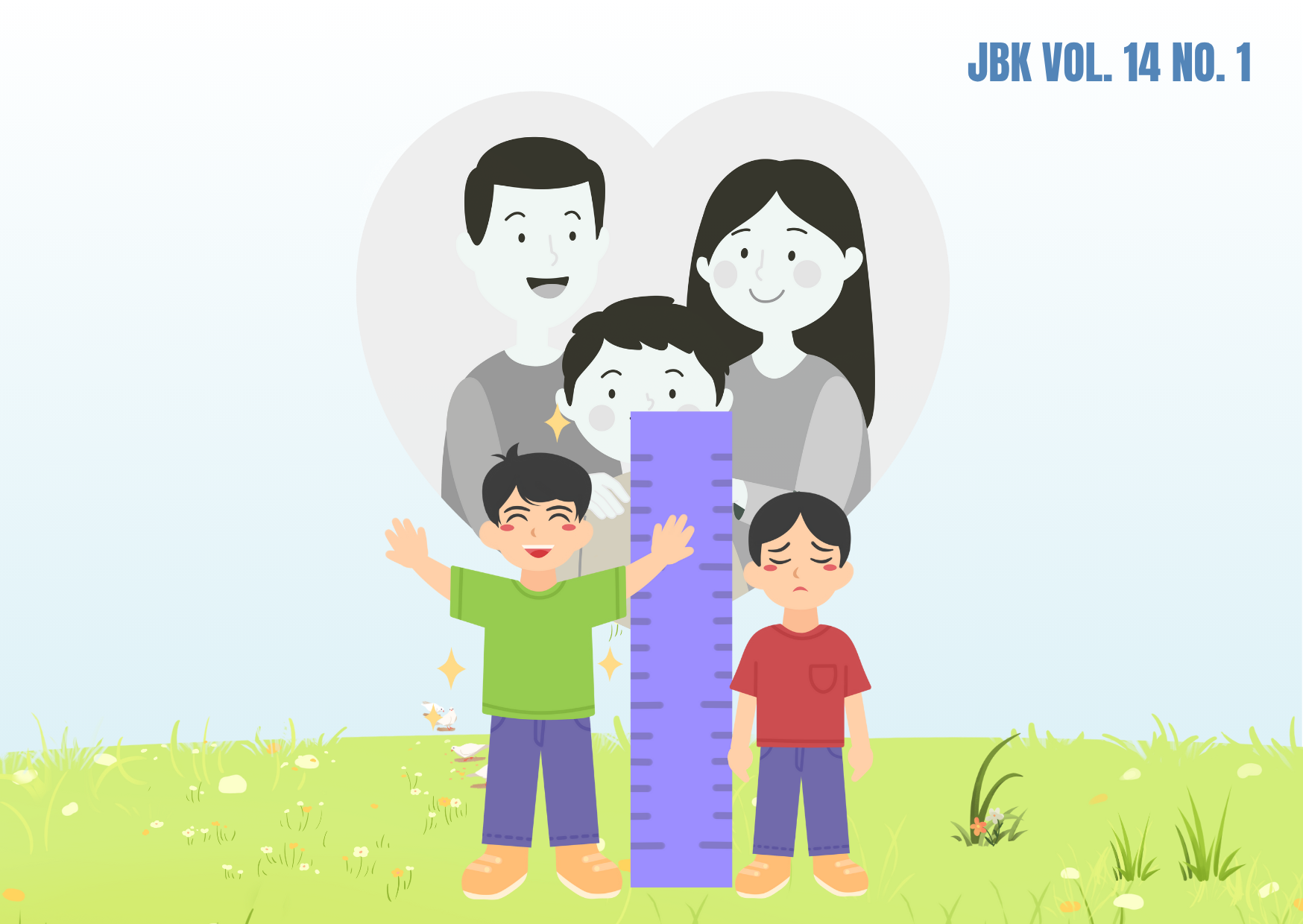CORRELATION OF MORBIDITY WITH SMOKING STATUS AND POSBINDU PTM TO PREPARE AGING SOCIETY HEALTH MANIFESTATION IN INDONESIA
Aging increases vulnerability to diseases, necessitating comprehensive strategies promoting healthy lifestyles. Posbindu PTM (Integrated Guidance Post for NCDs) is Indonesia's community-based program which was aimed to mitigate the impact of NCDs through monitoring risk factors and empowering individuals for early intervention and lifestyle’s changes. This study examined the correlations between smoking status, and implementation of Posbindu PTM among Indonesia's elderly population with morbidity rates. Data from 34 provinces were analyzed using Spearman's correlation test (α=5%) to examine relationships between morbidity rates (dependent variable) from the 2022 Elderly Population Statistics data, smoking status (active smokers, ex-smokers, non-smokers), and the percentage of Posbindu PTM implementation (independent variables) from the data of the 2021 Indonesia Health Profile. Active smokers (p=0.007, r=0.455) and ex-smokers (p=0.003, r=0.497) showed positive correlations with morbidity, while non-smokers (p=0.002, r=-0.506) exhibited a negative correlation. Posbindu PTM implementation (66,4% average in 2021) was not significantly correlated with morbidity (p=0.367). High smoking rates among Indonesia's elderly affect morbidity levels. Posbindu PTM, as an early detection and health promotion program, has not been well-implemented nationwide. Efforts and government commitment to prioritize health promotion and prevention at the grassroots level are essential for achieving a prosperous and effective aging society.
United Nations, Department of Economic and Social Affairs PD. World Population Ageing 2019 [Internet]. the United Nations. 2019. Available from: https://www.un.org/en/development/desa/population/publications/pdf/ageing/WorldPopulationAgeing2019-Report.pdf
Population Division of the Department of Economic and Social Affairs of the United Nations Secretariat. Changing population age structures and sustainable development. United Nations. 2017.
Badan Pusat Statistik. Angka Harapan Hidup (AHH) menurut Provinsi dan Jenis Kelamin [Internet]. Badan Pusat Statistik. 2021. p. 1–3. Available from: https://www.bps.go.id/linkTableDinamis/view/id/1114
Misnaniarti M. Situation Analysis of Elderly People and Efforts To Improve Social Welfare in Indonesia. J Ilmu Kesehat Masy. 2017;8(2):67–73.
Warsito T. Attaining The Demographic Bonus in Indonesia. J Pajak dan Keuang Negara [Internet]. 2019 Sep 1;1(1):6. Available from: https://jurnal.pknstan.ac.id/index.php/pkn/article/view/611
Maresova P, Javanmardi E, Barakovic S, Husic JB, Tomsone S, Kuca OK and K. Consequences of chronic diseases and.pdf. BMC Public Health. 2019;19(1431):1–17.
Chen Y chang, Lin K chung, Yeh SH, Wang CH, Pan AW, Chen HL, et al. Associations among quality of life, activities, and participation in elderly residents with joint contractures in long-term care facilities: a cross-sectional study. BMC Geriatr. 2022;22(1):1–16.
Ministry of Health of the Republic of Indonesia. Laporan Nasional Riskesdas 2018. Vol. 152, Ministry of Health of the Republic of Indonesia. 2018.
Basrowi RW, Rahayu EM, Khoe LC, Wasito E, Sundjaya T. The Road to Healthy Ageing: What Has Indonesia Achieved So Far? Nutrients [Internet]. 2021 Sep 28;13(10):3441. Available from: https://www.mdpi.com/2072-6643/13/10/3441
Daengthern L, Thojampa S, Kumpeera K, Wannapornsiri C, Boonpracom R. Factors affecting quality of life and longevity in the elderly people in Phrae City, Thailand. Asian Pacific Isl Nurs J [Internet]. 2020;5(2):48–54. Available from: https://www.ncbi.nlm.nih.gov/pmc/articles/PMC7544013/
Langmann E. Vulnerability, ageism, and health: is it helpful to label older adults as a vulnerable group in health care? Med Heal Care Philos [Internet]. 2023 Mar 19;26(1):133–42. Available from: https://link.springer.com/10.1007/s11019-022-10129-5
Figueiredo AEB, Ceccon RF, Figueiredo JHC. Doenças crônicas não transmissíveis e suas implicações na vida de idosos dependentes. Cien Saude Colet [Internet]. 2021 Jan;26(1):77–88. Available from: http://www.scielo.br/scielo.php?script=sci_arttext&pid=S1413-81232021000100077&tlng=pt
WHO. Noncommunicable diseases [Internet]. 2022. Available from: https://www.who.int/news-room/fact-sheets/detail/noncommunicable-diseases
Jaul E, Barron J. Age-related diseases and clinical and public health implications for the 85 years old and over population [Internet]. Frontiers in public health. frontiersin.org; 2017. Available from: https://www.frontiersin.org/articles/10.3389/fpubh.2017.00335/full
Khan HTA. Population ageing in a globalized world: Risks and dilemmas? J Eval Clin Pract [Internet]. 2019 Oct 28;25(5):754–60. Available from: https://onlinelibrary.wiley.com/doi/10.1111/jep.13071
Kopp W. Pathogenesis of (smoking-related) non-communicable diseases—Evidence for a common underlying pathophysiological pattern. Front Physiol [Internet]. 2022 Dec 15;13(December):1–20. Available from: https://www.frontiersin.org/articles/10.3389/fphys.2022.1037750/full
National Institute on Aging. Quitting Smoking for Older Adults [Internet]. 2023. Available from: https://www.nia.nih.gov/health/smoking/quitting-smoking-older-adults
Klopack ET, Carroll JE, Cole SW, Seeman TE, Crimmins EM. Lifetime exposure to smoking, epigenetic aging, and morbidity and mortality in older adults. Clin Epigenetics [Internet]. 2022 Dec 28;14(1):72. Available from: https://clinicalepigeneticsjournal.biomedcentral.com/articles/10.1186/s13148-022-01286-8
Whitson HE, Duan-Porter W, Schmader KE, Morey MC, Cohen HJ, Colón-Emeric CS. Physical Resilience in Older Adults: Systematic Review and Development of an Emerging Construct. Journals Gerontol Ser A Biol Sci Med Sci [Internet]. 2016 Apr;71(4):489–95. Available from: https://academic.oup.com/biomedgerontology/article-lookup/doi/10.1093/gerona/glv202
Jha P, Ramasundarahettige C, Landsman V, Rostron B, Thun M, Anderson RN, et al. 21st-Century Hazards of Smoking and Benefits of Cessation in the United States. N Engl J Med [Internet]. 2013 Jan 24;368(4):341–50. Available from: https://doi.org/10.1056/NEJMsa1211128
Dimyati KF. Correlations Between Physical Activity, Smoking Habit And Attitude In Elderly With Incidence of Osteoporosis. J Berk Epidemiol [Internet]. 2017 Apr 28;5(1):107. Available from: https://e-journal.unair.ac.id/JBE/article/view/1630
Holipah H, Sulistomo HW, Maharani A. Tobacco smoking and risk of all-cause mortality in Indonesia. PLoS One [Internet]. 2020;15(12 December):1–12. Available from: http://dx.doi.org/10.1371/journal.pone.0242558
Direktorat Statistik Kesejahteraan Rakyat. Statistik Penduduk Lanjut Usia 2022 [Internet]. Badan Pusat Statistik. Jakarta; 2022. Available from: https://www.bps.go.id/id/publication/2022/12/27/3752f1d1d9b41aa69be4c65c/statistik-penduduk-lanjut-usia-2022.html
Khan MR, Malik MA, Akhtar SN, Yadav S, Patel R. Multimorbidity and its associated risk factors among older adults in India. BMC Public Health [Internet]. 2022;1–8. Available from: https://doi.org/10.1186/s12889-022-13181-1
Dai Y, Zhang C-Y, Zhang B-Q, Li Z, Jiang C, Huang H-L. Social support and the self-rated health of older people. Medicine (Baltimore) [Internet]. 2016 Jun;95(24):e3881. Available from: https://journals.lww.com/00005792-201606140-00038
P2PTM Kementerian Kesehatan RI. Pelaksanaan dan Pencapaian: Promosi dan pencegahan,dan pengurangan faktor risiko PTM melalui pemberdayaan masyarakat. [Internet]. 2016 [cited 2024 Apr 18]. Available from: https://p2ptm.kemkes.go.id/profil-p2ptm/daftar-informasi-publik/pelaksanaan-dan-pencapaian
Siswati T, Margono, Husmarini N, Purnamaningrum YE, Paramashanti BA. Health-promoting university: the implementation of an integrated guidance post for non-communicable diseases (Posbindu PTM) among university employees. Glob Health Promot [Internet]. 2022 Sep 16;29(3):31–9. Available from: http://journals.sagepub.com/doi/10.1177/17579759211021363
Kemenkes RI. Petunjuk Teknis Pos Pembinaan Terpadu Penyakit Tidak Menular (Posbindu PTM). Ditjen Pengendali Penyakit dan Penyehatan Lingkungan, Kementeri Kesehat RI [Internet]. 2020;1–39. Available from: http://p2ptm.kemkes.go.id/uploads/2016/10/Petunjuk-Teknis-Pos-Pembinaan-Terpadu-Penyakit-Tidak-Menular-POSBINDU-PTM-2013.pdf
Siswati T, Kasjono HS, Olfah Y. “Posbindu PTM”: The Key of Early Detection and Decreasing Prevalence of Non-Communicable Diseases in Indonesia. Iran J Public Health [Internet]. 2022 Jul 17;51(7):1683–4. Available from: https://publish.kne-publishing.com/index.php/ijph/article/view/10105
Sujarwoto, Maharani A. Participation in community-based healthcare interventions and non-communicable diseases early detection of general population in Indonesia. SSM - Popul Heal [Internet]. 2022;19(September):101236. Available from: https://doi.org/10.1016/j.ssmph.2022.101236
Kemenkes RI. Profil Kesehatan Indonesia 2021 [Internet]. Pusat Data dan Teknologi Informasi, Kemenkes RI. 2022. 538 p. Available from: https://www.kemkes.go.id/id/profil-kesehatan-indonesia-2021
Kementerian Kesehatan RI. Petunjuk Teknis Pelaksanaan Posyandu Lanjut Usia dan Posbindu PTM Terintegrasi [Internet]. Jakarta: Kementerian Kesehatan RI; 2021. 56 p. Available from: https://repository.kemkes.go.id/book/62
Frieden TR. Six Components Necessary for Effective Public Health Program Implementation. Am J Public Health [Internet]. 2014 Jan;104(1):17–22. Available from: https://ajph.aphapublications.org/doi/full/10.2105/AJPH.2013.301608
Kemenkes RI. Peraturan Menteri Kesehatan RI No 71 Tahun 2015 Tentang Penanggulangan Penyakit Tidak Menular. Peratur Menteri Kesehat RI No 71 Tahun 2015 Tentang Penanggulangan Penyakit Tidak Menular. 2015;(1775):32.
Le Foll B, Piper ME, Fowler CD, Tonstad S, Bierut L, Lu L, et al. Tobacco and nicotine use. Nat Rev Dis Prim [Internet]. 2022;8(1):19. Available from: https://doi.org/10.1038/s41572-022-00346-w
Yamaguchi NH. Smoking, immunity, and DNA damage. Transl Lung Cancer Res [Internet]. 2019;8(Suppl 1):8–11. Available from: http://dx.doi.org/10.21037/tlcr.2019.03.02
Salehi Z, Fatemeh B, Motlagh N, Nourian YH. The controversial effect of smoking and nicotine in SARS-CoV-2 infection. 2023;0:1–29. Available from: https://doi.org/10.1186/s13223-023-00797-0
Parmar MP, Kaur M, Bhavanam S, Mulaka GSR, Ishfaq L, Vempati R, et al. A Systematic Review of the Effects of Smoking on the Cardiovascular System and General Health. Cureus [Internet]. 2023 Apr;15(4):e38073. Available from: https://www.ncbi.nlm.nih.gov/pmc/articles/PMC10208588/
Hussain A, Dulay P, Rivera MN, Aramouni C, Saxena V. Neoplastic Pathogenesis Associated with Cigarette Carcinogens. Cureus [Internet]. 2019 Jan;11(1):e3955. Available from: https://www.ncbi.nlm.nih.gov/pmc/articles/PMC6436676/
Arumsari D, Artanti KD, Martini S, Widati S. The Description of Smoking Degree Based on Brinkman Index in Patients With Lung Cancer. J Berk Epidemiol [Internet]. 2019 Sep 30;7(3):249. Available from: https://e-journal.unair.ac.id/JBE/article/view/12184
Jordan H, Hidajat M, Payne N, Adams J, White M, Ben-Shlomo Y. What are older smokers’ attitudes to quitting and how are they managed in primary care? An analysis of the cross-sectional English Smoking Toolkit Study. BMJ Open [Internet]. 2017 Nov 15;7(11):e018150. Available from: https://bmjopen.bmj.com/lookup/doi/10.1136/bmjopen-2017-018150
Liu M, Zheng M, He S. Association between tobacco smoking and heart disease in older adults: a cross-sectional study based on the Chinese Longitudinal Healthy Longevity Survey. Ann Transl Med [Internet]. 2023 Jan;11(2):63–63. Available from: https://atm.amegroups.com/article/view/108174/html
Mohebi S, Parham M, Sharifirad G, Gharlipour Z, Mohammadbeigi A, Rajati F. Relationship between perceived social support and self-care behavior in type 2 diabetics: A cross-sectional study. J Educ Health Promot [Internet]. 2018;7(1):48. Available from: http://www.jehp.net/text.asp?2018/7/1/48/229125
Liljas AEM, Walters K, Jovicic A, Iliffe S, Manthorpe J, Goodman C, et al. Strategies to improve engagement of ‘hard to reach’ older people in research on health promotion: a systematic review. BMC Public Health [Internet]. 2017;17(1):1–12. Available from: https://doi.org/10.1186/s12889-017-4241-8
Cristea M, Noja GG, Stefea P, Sala AL. The Impact of Population Aging and Public Health Support on EU Labor Markets. Int J Environ Res Public Health [Internet]. 2020 Feb;17(4). Available from: https://www.ncbi.nlm.nih.gov/pmc/articles/PMC7068414/
Fulmer BT, Reuben DB, Auerbach J, Fick DM, Galambos C, Johnson KS. Actualizing Better Health And Health Care For Older Adults. Health Aff [Internet]. 2021;40(2):219–25. Available from: https://www.healthaffairs.org/doi/epdf/10.1377/hlthaff.2020.01470
Pramana GAI, Aryani P, Yuliyatni PCD, Ani LS. Evaluasi Program Klinik Berhenti Merokok (KBM) di Puskesmas Banjarangkan 2. E-Jurnal Med Udayana [Internet]. 2021 Mar 30;10(3):58. Available from: https://ojs.unud.ac.id/index.php/eum/article/view/74489
Prihatiningsih D, Purwanti IS, Devhy NLP. Pengalaman Dalam Pelaksanaan Klinik Berhenti Merokok di Kota Denpasar. Bali Med J [Internet]. 2019 Dec 30;6(2):192–7. Available from: https://balimedikajurnal.com/index.php/bmj/article/view/85
Viana DA, Andrade FCD, Martins LC, Rodrigues LR, dos Santos Tavares DM. Differences in quality of life among older adults in Brazil according to smoking status and nicotine dependence. Health Qual Life Outcomes [Internet]. 2019 Dec 3;17(1):1. Available from: https://hqlo.biomedcentral.com/articles/10.1186/s12955-018-1072-y
National Center for Chronic Disease Prevention and Health Promotion (US) Office on Smoking and Health. Smoking Cessation: A Report of the Surgeon General [Internet]. Chapter 5,. Vol. 5, Washington (DC): US Department of Health and Human Services. 2020. Available from: https://www.ncbi.nlm.nih.gov/books/NBK555593/
Nicita-Mauro V, Lo Balbo C, Mento A, Nicita-Mauro C, Maltese G, Basile G. Smoking, aging and the centenarians. Exp Gerontol [Internet]. 2008 Feb;43(2):95–101. Available from: https://linkinghub.elsevier.com/retrieve/pii/S053155650700143X
Benowitz NL, Samet J, Soleimanpour N, Chaffee BW. Biomarkers of improved health outcomes after smoking cessation. Addict Neurosci [Internet]. 2023;5:100054. Available from: https://www.sciencedirect.com/science/article/pii/S2772392522000499
Gallucci G, Tartarone A, Lerose R, Lalinga AV, Capobianco AM. Cardiovascular risk of smoking and benefits of smoking cessation. 2020;12(7):3866–76.
Mcafee T, Malone RE, Cataldo J. Ignoring our elders : tobacco control ’ s forgotten health equity issue. Tob Control. 2021;30(5):479–80.
Suprayitno E, Hidayat S, Permatasari D, Dwi E. Community-Based Health Education Improve Knowledge and Attitudes of COVID-19 Prevention. 2021;5(1):136–45. Available from: https://doi.org/10.30994/jnp.v5i1.164
Hariyono, Ni Luh Ayu Megasari, Andri Setya Wahyudi. Efforts to empowerment the Community and Health Involunters Related to Non-Communicable Diseases (PTM) through Strengthening Posbindu. Sci Midwifery [Internet]. 2022 Sep 16;10(4):2510–7. Available from: https://www.midwifery.iocspublisher.org/index.php/midwifery/article/view/702
Copyright (c) 2024 Jurnal Biometrika dan Kependudukan (Journal of Biometrics and Population)

This work is licensed under a Creative Commons Attribution-NonCommercial-ShareAlike 4.0 International License.
Copyright©2022 Jurnal Biometrika dan Kependudukan (Journal of Biometrics and Population)
This work is licensed under a Creative Commons Attribution-NonCommercial-ShareAlike 4.0 International License.
1. Copyright of all journal manuscripts is held by the Jurnal Biometrika dan Kependudukan.
2. Formal legal provisions to access digital articles of the electronic journals are subject to the provision of the Creative Commons Attribution-ShareAlike license (CC BY-NC-SA), which means that Jurnal Kesehatan Biometrika dan Kependudukan to keep, transfer media/format, manage in the form of databases, maintain, and publish articles.
3. Published manuscripts both printed and electronic are open access for educational, research, and library purposes. Additionally, the editorial board is not responsible for any violations of copyright law.



































